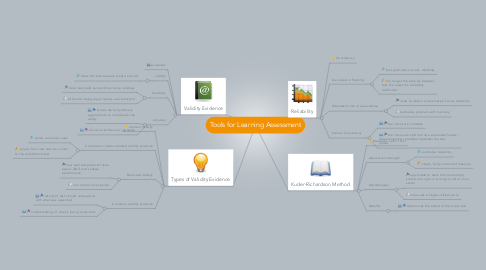
1. Validity Evidence
1.1. evaluates
1.2. validity
1.2.1. does the test measure what it should
1.3. reliability
1.3.1. does test yield same/similar score rankings
1.3.2. all factors being equal results are consistent
1.4. accuracy
1.4.1. scores are fairly/closely approximate to individuals true ability
1.4.2. similar to skill level or aptitude
2. Types of Validity Evidence
2.1. Content Validity
2.2. Concurrent criterion-related validity evidence
2.2.1. yields numerical value
2.2.2. scores from new test are similar to the established test
2.3. Predictive Validity
2.3.1. how well test predicts future exams (SAT) and college performance
2.3.2. non numerical response
2.4. Construct validity evidence
2.4.1. results of test should correspond with what was expected
2.4.2. understanding of what is being measured
3. Reliability
3.1. Consistency
3.2. Test-retest or Stability
3.2.1. test given twice to est. reliability
3.2.2. the longer the intervals between test, the lower the reliability coefficient
3.3. Alternate forms or equivalence
3.3.1. used to obtain an estimate of score reliability
3.3.2. estimates problem with memory
3.4. Internal Consistency
3.4.1. test items will correlate
3.4.2. test items are split into two equivalent halves - determines the correlation between the two halves
4. Kuder-Richardson Method
4.1. Measures half of Test
4.2. Assessment strength
4.2.1. estimates reliability
4.2.2. single, fairly consistent measure
4.3. Advantanges
4.3.1. applicable to tests that are multiply scored (not right or wrong) or (all or none score)
4.3.2. measures a single unified score
4.4. Benefits
4.4.1. determines the extent of the entire test
